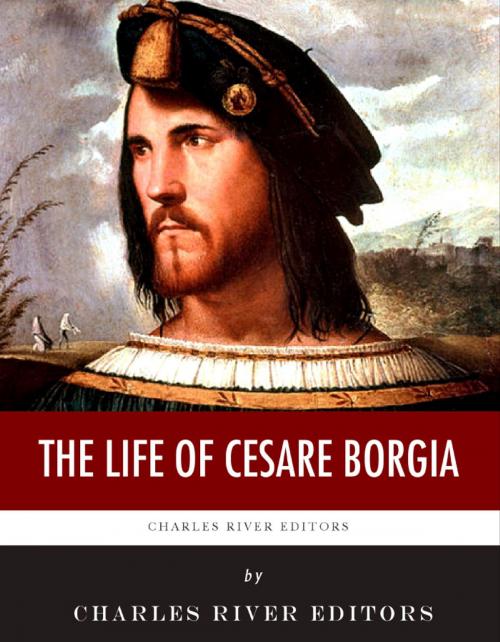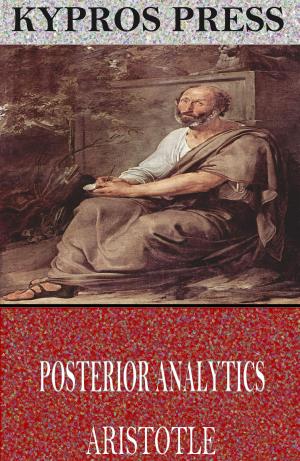The Life of Cesare Borgia
Nonfiction, History, Renaissance, Biography & Memoir, Political, Historical| Author: | Charles River Editors | ISBN: | 9781475319477 |
| Publisher: | Charles River Editors | Publication: | November 14, 2012 |
| Imprint: | Language: | English |
| Author: | Charles River Editors |
| ISBN: | 9781475319477 |
| Publisher: | Charles River Editors |
| Publication: | November 14, 2012 |
| Imprint: | |
| Language: | English |
Includes:•Charles River Editors original biography of Cesare Borgia•Raphael Sabatinis The Life of Cesare Borgia"Cesare Borgia was considered cruel; nonetheless, that cruelty united Romagna and brought it peace and stability. On careful reflection, he was more merciful than the Florentines, who, in order to avoid being seen as cruel, allowed Pistoia to be destroyed. Therefore a prince, so long as he keeps his subjects united and loyal, ought not to mind the reproach of cruelty; because with a few examples he will be more merciful than those who, through too much mercy, allow disorders to arise, from which follow murders or robberies. Machiavelli, The PrinceIn one of the most famous political treatises in history, Niccolo Machiavelli famously advises those who hold power that it is better to be feared than loved. Though he uses Cesare as a cautionary tale about acquiring power through the good-will and powers of another person (his father, Pope Alexander VI), it is clear in The Prince that Machiavelli holds out Cesare as a skillful, effective ruler and administrator. In many ways, Cesare has been characterized as the prince Machiavelli tells his readers to be. As one translator of The Prince put it, Cesare is cited as a type of the man who rises on the fortune of others, and falls with them; who takes every course that might be expected from a prudent man but the course which will save him; who is prepared for all eventualities but the one which happens; and who, when all his abilities fail to carry him through, exclaims that it was not his fault, but an extraordinary and unforeseen fatality.500 years after Cesares death, he and his family have come to be associated more with crime, specifically murder and state-sponsored violence. While 21st century TV series have cast the Borgias as the first organized crime family, the rumors spread by the familys political opponents in the late 15th century have taken hold among a fascinated public. Did Cesare really have an incestuous relationship with sister Lucrezia? Did he really kill his own brother Giovanni (Juan)? While Cesare may not have been as colorful or criminal as the enduring legends, there is no question he was manipulative, ruthless and, for a short time at least, effective. He helped make his father's papacy a success, but his rise was as dramatic as his fall. To the extent that the Borgias are still associated with murder and mayhem, Cesares actions can be credited with the lions share of the perception. Not surprisingly, almost everything about Cesares life is still up for debate, even one long-held assertion by the likes of Alexandre Dumas that Cesares likeness was used by Renaissance artists to paint images of Jesus Christ during and after his life. The Life of Cesare Borgia chronicles Cesares life and discusses the legends and myths about him in an attempt to separate fact from fiction. This collection includes an original biography on Cesare and Sabatinis famous biography of him. It also includes a Table of Contents and pictures of important people in his life.
Includes:•Charles River Editors original biography of Cesare Borgia•Raphael Sabatinis The Life of Cesare Borgia"Cesare Borgia was considered cruel; nonetheless, that cruelty united Romagna and brought it peace and stability. On careful reflection, he was more merciful than the Florentines, who, in order to avoid being seen as cruel, allowed Pistoia to be destroyed. Therefore a prince, so long as he keeps his subjects united and loyal, ought not to mind the reproach of cruelty; because with a few examples he will be more merciful than those who, through too much mercy, allow disorders to arise, from which follow murders or robberies. Machiavelli, The PrinceIn one of the most famous political treatises in history, Niccolo Machiavelli famously advises those who hold power that it is better to be feared than loved. Though he uses Cesare as a cautionary tale about acquiring power through the good-will and powers of another person (his father, Pope Alexander VI), it is clear in The Prince that Machiavelli holds out Cesare as a skillful, effective ruler and administrator. In many ways, Cesare has been characterized as the prince Machiavelli tells his readers to be. As one translator of The Prince put it, Cesare is cited as a type of the man who rises on the fortune of others, and falls with them; who takes every course that might be expected from a prudent man but the course which will save him; who is prepared for all eventualities but the one which happens; and who, when all his abilities fail to carry him through, exclaims that it was not his fault, but an extraordinary and unforeseen fatality.500 years after Cesares death, he and his family have come to be associated more with crime, specifically murder and state-sponsored violence. While 21st century TV series have cast the Borgias as the first organized crime family, the rumors spread by the familys political opponents in the late 15th century have taken hold among a fascinated public. Did Cesare really have an incestuous relationship with sister Lucrezia? Did he really kill his own brother Giovanni (Juan)? While Cesare may not have been as colorful or criminal as the enduring legends, there is no question he was manipulative, ruthless and, for a short time at least, effective. He helped make his father's papacy a success, but his rise was as dramatic as his fall. To the extent that the Borgias are still associated with murder and mayhem, Cesares actions can be credited with the lions share of the perception. Not surprisingly, almost everything about Cesares life is still up for debate, even one long-held assertion by the likes of Alexandre Dumas that Cesares likeness was used by Renaissance artists to paint images of Jesus Christ during and after his life. The Life of Cesare Borgia chronicles Cesares life and discusses the legends and myths about him in an attempt to separate fact from fiction. This collection includes an original biography on Cesare and Sabatinis famous biography of him. It also includes a Table of Contents and pictures of important people in his life.















